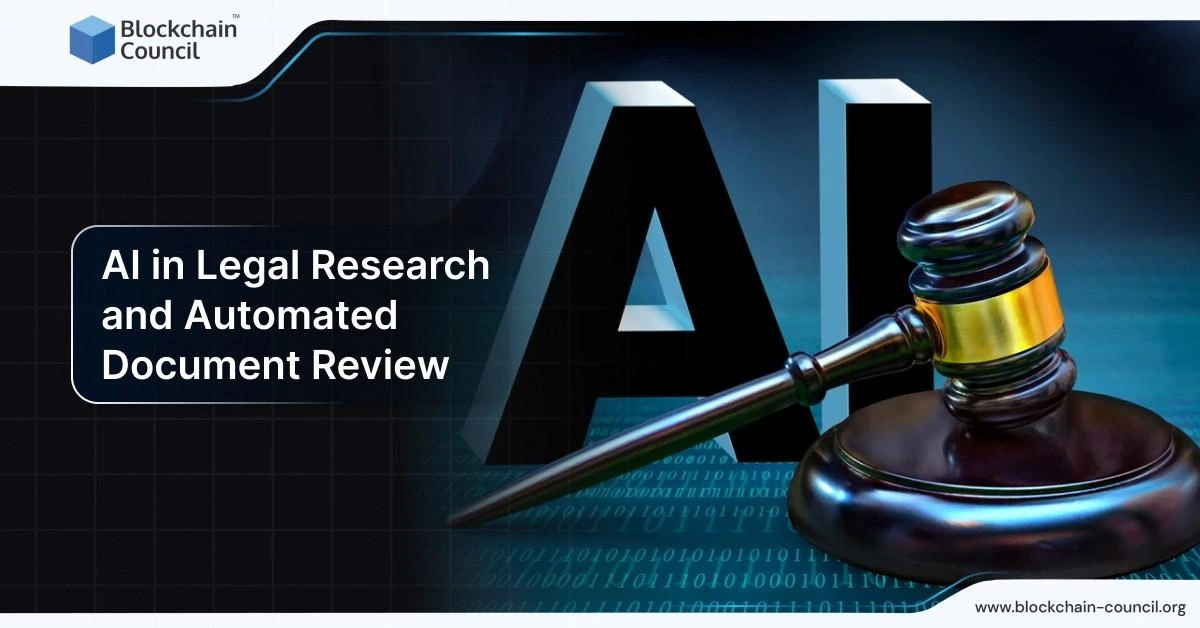
- Blockchain Council
- October 24, 2024
Artificial Intelligence (AI) has brought notable changes to the legal world, especially in how legal research and automated document reviews are conducted. Its ability to scan enormous amounts of data, analyze it, and even create summaries has led to higher efficiency and improved accuracy.
AI’s Role in Legal Research
AI has been a helpful tool in speeding up legal research. It allows professionals to locate relevant laws, cases, and other critical resources much faster than older, traditional methods. One tool, Westlaw Precision, has integrated AI-powered research features. Lawyers can now ask questions in plain language, and AI provides answers by linking them to reliable sources, helping reduce errors that might happen when working with extensive texts.
In 2023, Thomson Reuters widened its offerings by including generative AI within Westlaw Precision, greatly improving how it assists with legal research. Lawyers now have tools to automate initial research stages, saving them valuable time that would typically go into manually reading through long documents.
Earning the Certified Artificial Intelligence (AI) Expert™ certification equips professionals with a deeper understanding of how AI is applied across different industries, including legal research and automated document review.
AI in Document Review
The automation of document review, commonly known as eDiscovery, is another significant way AI has changed legal tasks. Traditionally, large-scale document reviews would take several months, requiring teams of attorneys to go through each document. Now, AI-powered systems can handle a lot of that work. By automating the process of sorting and reviewing electronic documents, AI can quickly identify important details, find inconsistencies, and even flag risks.
AI shines in organizing documents, recognizing patterns, and spotting legal issues. For instance, Redgrave Data recently showed the capabilities of AI in eDiscovery by comparing it against human review teams. The results demonstrated that AI could produce equal or even better results, in much less time, and at a fraction of the usual cost.
Real-life Examples of AI in Document Review
In 2024, the DWF Group highlighted how AI can support tasks like identifying privileged communication, sorting confidential materials, and tracking deadlines in highly regulated environments. They used AI to examine a batch of 50,000 documents, reducing the manual review time by more than 75%. This led to considerable cost savings, allowing legal teams to dedicate more time to strategic decisions rather than routine tasks.
Another example is AI’s role in contract review. Legal teams need to ensure that contracts comply with legal requirements and company guidelines. AI tools help by pointing out deviations from standard clauses, flagging missing data, and even suggesting corrections. Solutions like those from Pocketlaw also streamline the contract drafting process, speeding up workflows and minimizing human mistakes.
Crafting precise prompts is essential when working with AI tools, particularly in fields like legal document automation. So, the Certified Prompt Engineer™ credential is an excellent choice for those seeking to enhance their AI expertise.
Benefits and Challenges of AI in Document Review
AI adoption in legal research and document review brings various benefits. The biggest advantage is the time saved. What once took days or months in manual review can now be done in mere hours. And, it’s not just about speed—AI systems learn from previous data, improving their ability to flag issues and ensure everything is correct.
Another benefit is reduced human error. AI provides consistent results every time. Tools like CAL (Computer-Assisted Review) offer better accuracy by spotting documents a human might overlook when pressed for time.
However, AI isn’t without challenges. One of the main concerns is its “black box” nature. Lawyers may not always fully understand how the AI comes to its conclusions. Because AI is only as good as the data it is fed, legal professionals must be careful, as biases or false positives may appear. There’s also worry among some that AI lacks the human insight needed for more complex legal matters.
If you’re looking to broaden your knowledge of AI’s role in transforming industries like legal research, the Master Artificial Intelligence (AI) Learning Path offers valuable insights that can enhance your ability to contribute to AI-driven processes.
Ethical Concerns and What’s Next
As AI becomes a more regular part of legal work, its ethical use comes into question. There’s a growing concern about relying too much on technology, especially when dealing with sensitive legal decisions. Many argue that AI should enhance, but not replace, human effort. Recent regulatory updates, such as new guidelines for AI in federal trials in the US, highlight the increasing need for governance in this area.
Looking ahead, AI is expected to play a larger role in legal work. Investments from companies like Thomson Reuters and Microsoft indicate that the legal field is gearing up for broader AI adoption. In-house legal teams and law firms are already experimenting with AI not just for research and review but also for tasks like drafting documents, summarizing information, and predicting case outcomes.
As AI continues to play a growing role in the legal sector, obtaining the Certified Artificial Intelligence (AI) Developer™ credential equips you with the skills to create more efficient solutions for document review and legal research systems.
Final Thoughts
AI has already made a big difference in legal research and document review, bringing practical tools that help find relevant information and automate analysis. By using AI, legal professionals can spend more time on strategy and important decision-making.
As AI tools continue to evolve, law firms and departments that embrace these changes will likely see improvements in both cost-effectiveness and workflow. That said, the human element remains vital—legal professionals must always ensure that AI is used in a responsible and ethical way in their practice.
AI applications in legal research demand up-to-date knowledge. Our Unlimited Learning Subscription (AI) offers access to the latest advancements, helping professionals stay ahead in areas like document automation and review.


































































 Guides
Guides News
News Blockchain
Blockchain Cryptocurrency
& Digital Assets
Cryptocurrency
& Digital Assets Web3
Web3 Metaverse & NFTs
Metaverse & NFTs
